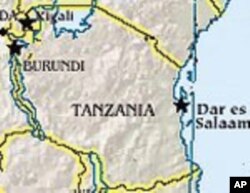Three U.S. senators have introduced a bill to bring a more flexible approach to sanctions against Zimbabwe. Africa Action Executive Director Gerald LeMelle says the Zimbabwe Transition to Democracy and Economic Recovery Act (DEERA), sponsored by Senators Russ Feingold (D-Wisconsin), Johnny Isakson (R-Georgia), and John Kerry (D-Massachusetts), is needed to counter the excesses of what he calls Zimbabwe President Robert Mugabe’s lifelong, hardened critics.
“There are very powerful interests who have never liked Robert Mugabe, and this is an obsession to the point where they want to defeat or ignore anything that may benefit Zimbabwe if it means that Zimbabwe will be seen in a successful light,” he said.
The Senate bill was introduced one day before African leaders begin meeting in Dar Es Salaam, Tanzania at the 20th World Economic Forum on Africa. With this year’s theme of the Geneva-based organization focusing on “Rethinking Africa’s Growth,” investors are expected to engage President Mugabe, Prime Minister Morgan Tsvangirai, and Indigenization Minister Saviour Kasukuwere on Mr. Mugabe’s plan to transfer majority control of large firms to black indigenous investors.
Gerald LeMelle said a U.S. revision of a 2001 sanctions law approved by former President George W. Bush, the Zimbabwe Economic and Democracy Recovery Act (ZEDERA), is warranted because the tough penalties imposed by President Mugabe’s foreign opponents have inflicted hardships on the country. He said they are counterproductive to the goals of promoting democracy and relieving enormous economic strains endured by the general population.
“That’s the kind of attitude that helps contribute to the poverty and the failed states and all of the problems that we see in the national security state we are in right now. We at Africa Action have spent an enormous amount of time and energy trying to educate people as to what is really going on. The key is whether the power of the forces who have a deep-seated hatred for Mugabe are going to win,” argued LeMelle.
By pursuing a U.S. policy that helps rehabilitate the fledgling unity government by helping poor and middle-class citizens make an economic recovery, LeMelle said Washington’s new legislation is adapting to the new realities of Zimbabwe’s transformation that will help pave the way for more representative government under a new constitution. In any case, he notes, Mugabe allies have demonstrated the futility of pursuing a stringent sanctions policy by their skills at evading many of the restrictions.
“The DEERA does continue with the targeted sanctions on Mugabe and his closest people. It gives us a little more flexibility in constantly monitoring who on his team we are actually targeting the sanctions towards and how that is being monitored. In the past, several people around President Mugabe have been able to get around sanctions,” he noted.
Provisions of the new Senate bill include providing technical assistance to reformist government ministries, the promotion of agricultural development with policies consistent with reestablishing the security of land tenure, and curbing illegal diamond activities by pushing for Zimbabwe’s suspension from the Kimberley Process. The legislation also seeks regional and international cooperation in preparing for future elections whose conduct can avoid a resort to violence and other abuses.
Another provision, which Gerald LeMelle’s Africa Action advocacy group pushed for would encourage the start of deliberations on the restructuring, rescheduling, and perhaps even the cancellation of Harare’s debt to international and private financial institutions.













